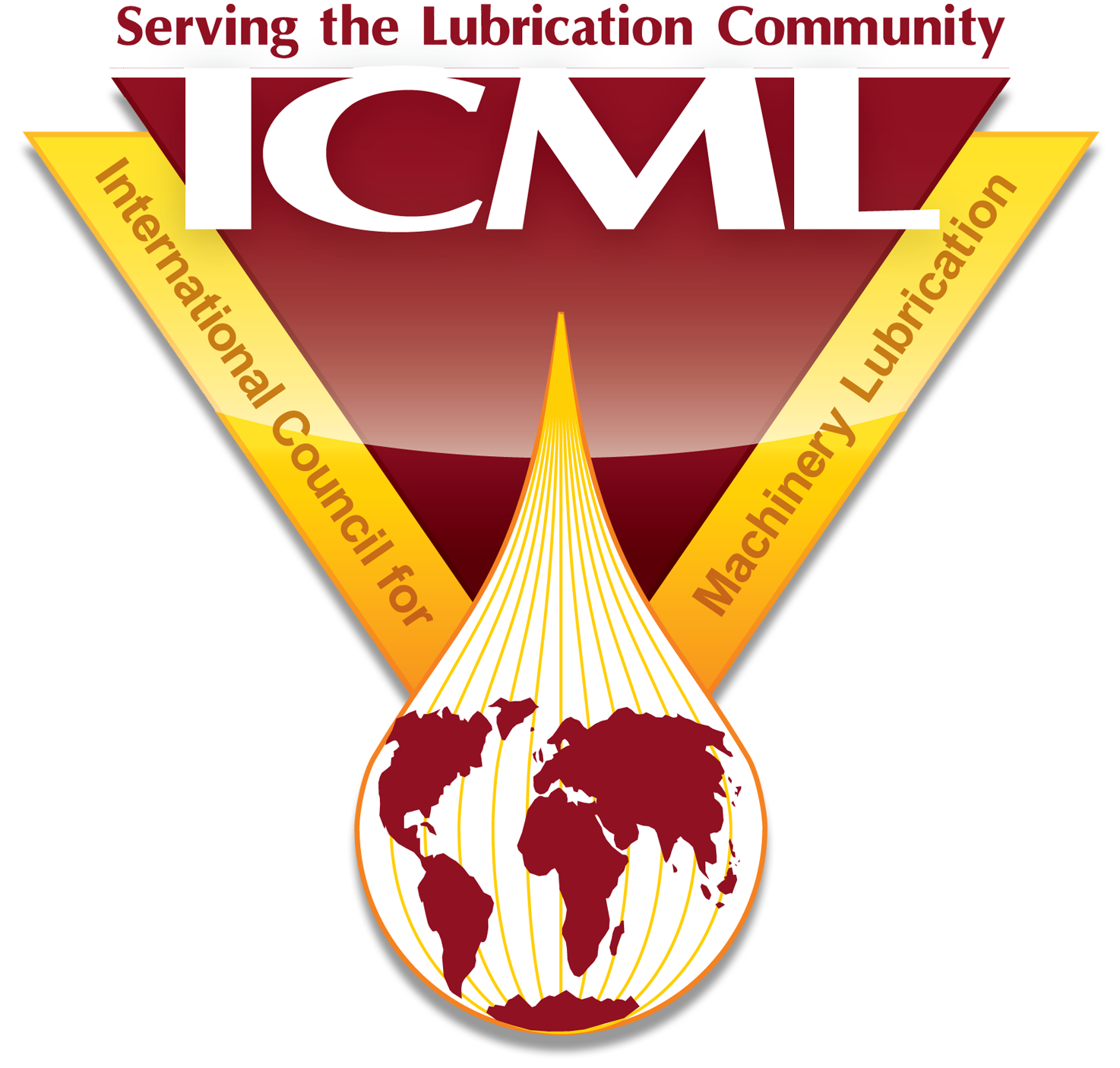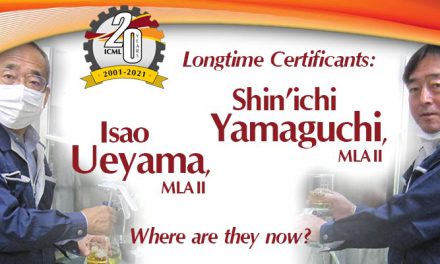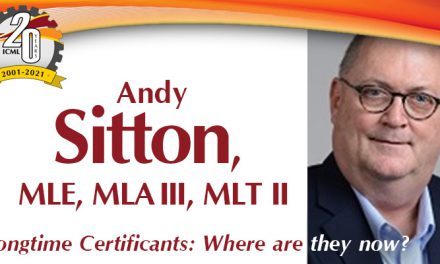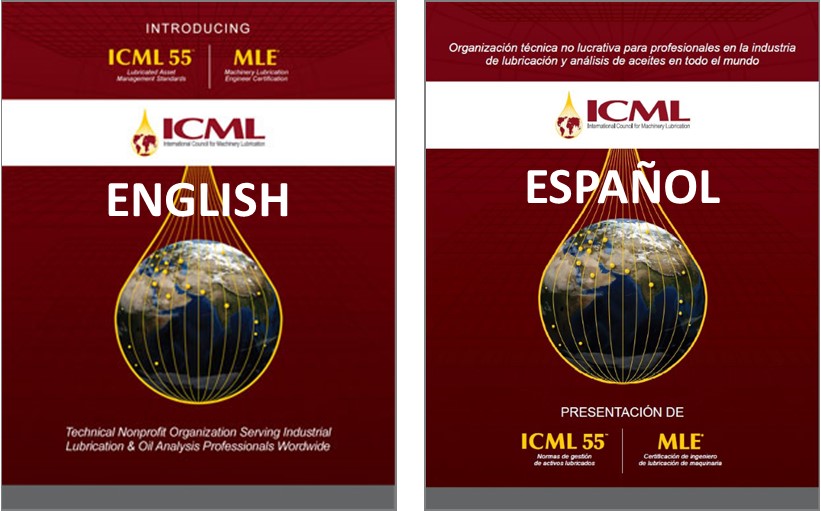You may have noticed that ICML has stepped up its activity on social media this year, particularly on Twitter and LinkedIn groups. Given that our mission is to help lubrication practitioners succeed and advance in their professional careers, our social media activity reflects only a small part of our recent strategic efforts to be more relevant to more people more often than before.
We did commission our first-ever brand/market research in the spring of 2018, and I offer my sincere thanks to those readers who took time to participate in interviews and to complete our comprehensive online survey. Findings from this effort are helping inform ICML’s long-term decisions regarding the most effective ways to serve and support our growing worldwide network of practitioners, trainers, volunteers, partners, and members for the years ahead.
Beyond the aforementioned Twitter and LinkedIn venues, we have other tactics in the works, too. For instance, ICML’s email communications have become more frequent. And I have spent a good portion of this year mapping out the content and release of a new website. In fact, as I type this in late June I am inclined to say, “Keep an eye out for ICML’s new website content, featuring expanded member benefits, success stories, member recognition, and our community discussion forum.” But by the time this article appears in print, it is possible that our website expansion will have been up and running for a while and this would all be old news. So, I really shouldn’t say anything about it at all. (Oops.)
The relevance of camaraderie and community
Speaking of our Twitter account, LinkedIn group, and potential community discussion forum, let us take a look at the topic of camaraderie. I am a firm believer in the impact of positive relationships on a person’s overall job experience, and I believe that human interaction—even virtual human interaction and validation—correlates directly with job effectiveness.
“What if you are the only ICML-certified player trying to optimize your plant’s lubrication program?”
Studies tend to show that employees often enjoy their jobs for reasons unrelated to compensation. While income is certainly important, it is not necessarily the primary driver that makes team members want to fulfill their duties day after day. For instance, a 2017 study of 615,000 Glassdoor users found that organizational culture and values are the largest predictors of employee satisfaction, while compensation was among the least influential, across all income levels. [See “Does More Money Change What We Value at Work?” by Patrick Wong, January 17, 2017.]
And this certainly makes sense. Let’s face it, many lubrication and oil analysis practitioners reading this article probably spend at least as much (if not more) time engaging with their colleagues as they do with their own families, so exposure to job-related relationships is going to impact employee satisfaction one way or another.
“Camaraderie is more than just having fun, though,” observed Adelphi University President Christine Riordan a few years ago. “It is also about creating a common sense of purpose and the mentality that we are in-it together,” which fosters a very real esprit de corps of mutual respect and sense of identity. [See “We All Need Friends at Work,” July 3, 2013.]
But what if you are the only ICML-certified player trying to optimize your plant’s lubrication program? How can you develop helpful relationships with a community of like-minded professionals when you are the only one on site? Beyond spending time with fellow team mates in the physical plant, employees can also find this esprit de corps through professional associations and volunteer activities, and even in virtual communities where they can regularly exchange ideas, establish long-distance friendships, showcase their expertise, and conduct networking. For the lubrication practitioner who needs a job to be more than just a paycheck, or who seeks a broader network of associates than is available in his immediate workplace, participating in such opportunities can bring a great level of personal satisfaction.
And satisfaction is important, because happy employees are the best employees to have on your lubrication crew. They are inherently productive and confident, motivated to do their best, and more likely to stay with you.
ICML’s role with camaraderie and community
Inasmuch as ICML exists to help practitioners, it makes sense that we should provide opportunities for certified practitioners to be a part of something bigger than themselves, to see and be seen, to visit and build a community. Because our certified practitioners are spread across the globe, our online presence is as good a place as any to get started with virtual camaraderie.
This brings me back to the subject of online discussions for lubrication and oil analysis professionals. Even while developing new website infrastructure and content these past few months, ICML has depended on our Twitter and LinkedIn group channels to serve as community forums of sorts, with the idea that such forums can help foster camaraderie. These venues make it easy for our members and partners—in fact, all friends of ICML—to share with each other their own articles, ideas, links, questions & answers about anything related to lubrication or oil analysis. These channels are also suitable for broader social support, which Riordan notes can include such matters as “rooting for each other on promotions, consoling each other about mistakes, [and] giving advice.” ICML does what it can to seed these venues with starter topics and links to relevant articles, but the real community only grows out of personal engagement from certified practitioners and group members. True virtual community and camaraderie is organic; it can only be crowdsourced.
What kinds of starter topics does ICML find and post? Almost anything that deals generally with vendor-neutral stories that we think are relevant to our mission, market, and members. Additionally, as we build up our new website content, we will also steer followers to ICML-sponsored success stories, case studies, and blog posts. But in the meantime we scour the web to prompt community engagement with a grab bag of Twitter topics and retweets about manufacturing news, people power, lubrication incidents, ICML exams, opinion articles, and more. Here is a sampling:
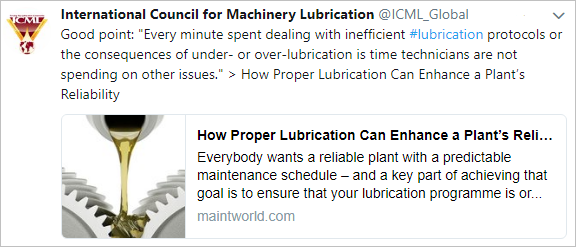
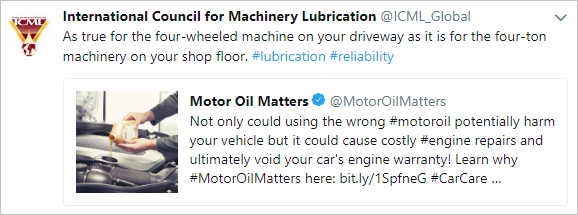


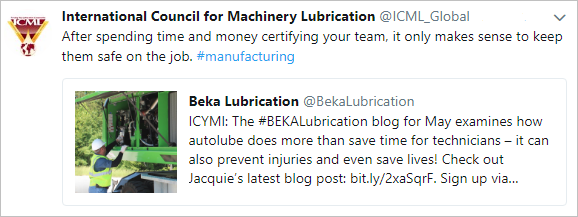
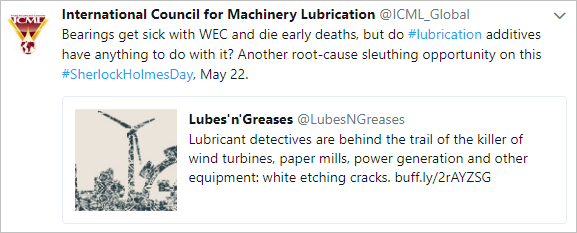
Plus the occasional light-hearted entry:
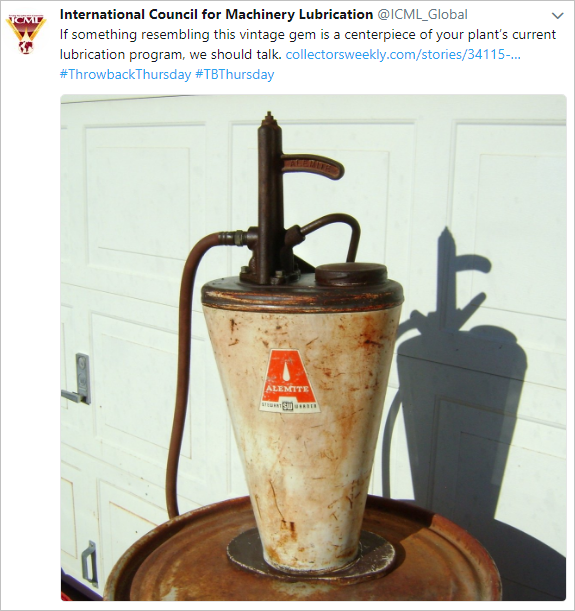
And our LinkedIn group (which requires at least a free LinkedIn account) is always open to new topics, while inviting responses to headlines such as these:
- “How much automation does your lubrication program really need?”
- “Tribological practices are only as good as the people practicing them.”
- “In used oil lubricants, if viscosity is coming high, then what should be percentage of top-up new lubricants?”
- “The economic ‘butterfly effect’ of better lubrication”
- “Save your way to prosperity? There’s more to it than that.”
- “Don’t let your plant literally ‘grind to a halt.’”
It’s not necessarily easy to grow camaraderie through a virtual community, so ICML’s Twitter and LinkedIn group channels are just a start. I encourage our readers and followers to join and submit original posts to our LinkedIn group, and also to include our @ICML_Global handle in their relevant Twitter posts.
Finally, years from now when you are retired from industry, what do you think you will miss more: lubrication tasks or the camaraderie of your colleagues and friends? As indicated above, we are pursuing various community opportunities as part of a larger ICML strategy so that 2019 will be a more fruitful and memorable year filled with comradeship for all our certified members.
